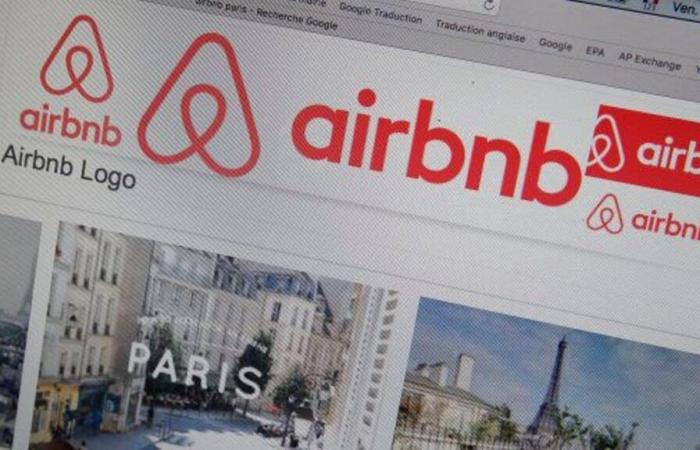Chesnot via Getty Images
This Thursday, November 7, Parliament gave its final green light to a law aimed at better regulating the market for furnished tourist accommodation (Illustrative photo).
HOUSING – A response to the housing crisis in tense areas. This Thursday, November 7, Parliament gave its definitive green light to a law aimed at better regulating the furnished tourist market, that is to say properties rented on platforms such as Airbnb or Booking. In particular, it plans to reduce the tax advantages conferred on this type of rental and to strengthen the control powers of mayors.
The National Assembly adopted this text by a large majority and only the far right voted against. The law, the subject of a compromise between the two chambers of Parliament, had already been unanimously approved Tuesday by the Senate. HuffPost takes stock of what its adoption changes for rental companies and municipalities.
• Fewer tax advantages to better “regulate” furnished accommodation
The flagship measure of this law aims to reduce the tax advantages of furnished tourist rentals compared to residential rentals, explains Public Senate.
Today, owners of Airbnb-type accommodation (known as “ classified “) benefit from a flat-rate reduction of 71% on rents received, compared to 50% for classic furnished rentals and only 30% for classic empty rentals. The regulatory law therefore proposes that classified furnished accommodation and guest rooms benefit from a reduction reduced from 71% to 50%, and from a ceiling lowered to 77,700 euros.
For unclassified furnished tourist accommodation, the tax reduction will drop from 50% to 30%, thus aligning with unfurnished rentals, with a ceiling of 15,000 euros.
The objective of this measure is to “regulate” furnished apartments, certainly an activity “necessary in tourist areas”more “which is today taking on an uncontrollable scale”, Macronist MP Annaïg Le Meur, among the elected officials behind the project, explained on October 28. Because the boom in Airbnb-type rentals, particularly in large cities, has contributed to “promote speculation” and to “further complicate access to housing” classic, she observed.
• A “toolbox” for mayors
Always with the aim of “regulate” the phenomenon, the text also gives mayors a “toolbox”explained in a press release PS deputy Inaki Echaniz, co-author of the law. If they deem it necessary, elected officials will be able to cap the number of days in the year where an individual can rent their main residence on a platform at 90 (instead of the current 120).
All municipalities will also be able to set up quotas for furnished tourist accommodation. And those located in “tense area”or comprising more than 20% secondary residences, may designate, in their local urban planning plan (PLU), areas reserved for the construction of main residences.
In Paris, the next PLU, which will be voted on in mid-November, must therefore include a ban on new furnished tourist rentals in the Montmartre district, in the Marais and around the Eiffel Tower, according to Ian Brossat, communist senator and advisor to Paris town hall.
It remains to be seen how many cities will seize these new possibilities, while so far, only 350 municipalities have imposed restrictions on the 4,000 that could, according to an Airbnb count.
• Ban on “thermal strainers”
Third measure: new furnished tourist accommodation must comply with the same energy renovation obligations as ordinary rentals, recalls Le Figaro.
Today, the “thermal strainers”i.e. accommodation classified E, F or G on the Energy Performance Diagnosis (DPE), can be rented unlike long-term rental. Airbnb type accommodations labeled G on the DPE will be banned in 2025, those classified F in 2028 and E in 2034, specifies Public Senate.
• More supporting documents for rental companies
Fourth measure which could make some owners cringe: the generalization of the registration number for all furnished properties (main and secondary residence). The lessor must also provide proof of ownership and inform their co-ownership association, which may decide in its regulations whether or not to prohibit the rental of furnished tourist accommodation.
The creation of new accommodation for furnished tourist rental will also be subject in all municipalities to authorization for change of use, if residential accommodation becomes accommodation for commercial use.
The new law was welcomed by representatives of hoteliers who saw it as “a balanced response to the needs of our fellow citizens and the economic imperatives of the hotel sector”.
Conversely, Airbnb, of which France is the second largest market and which hosts rental offers in more than 29,000 municipalities in the country, has “regretted” the restrictions brought by a text which, according to her, will not resolve the problems of access to housing.
Also see on HuffPost :
Reading this content may result in cookies being placed by the third party operator who hosts it. Taking into account the choices you have expressed regarding the deposit of cookies, we have blocked the display of this content. If you wish to access it, you must accept the “Third Party Content” category of cookies by clicking on the button below.
Play Video






